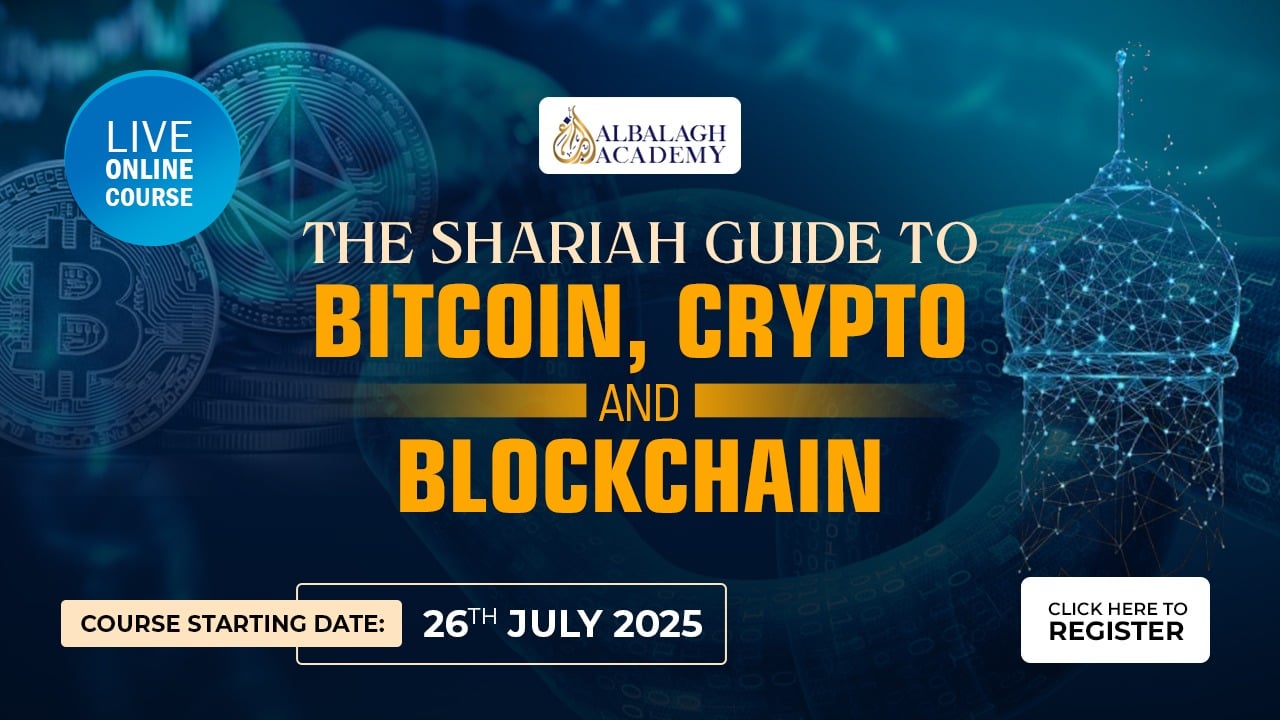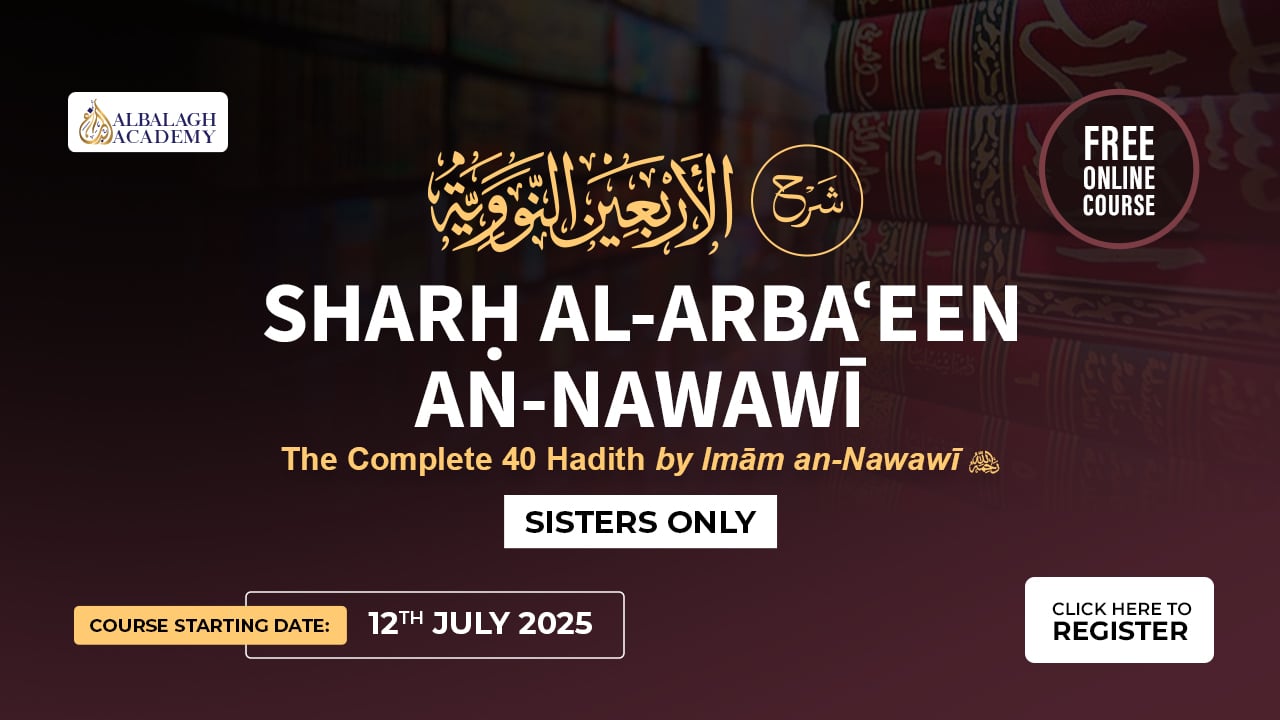Al Balāgh Online ʿĀlimiyyah Programme
(Accepting applications for September 2025 intake)
▼
Batch 1
(Part time – Sisters)
Deadline: 31st August 2025
Start Date: 1st September 2025
Days: Mon, Wedn & Thurs (Weekday)
Time:
10 AM – 1 PM (London)
7 PM – 10 PM (Sydney)
11 AM – 2 PM (Berlin)
(We will follow London time after the timezone shift)
Batch 2
(Part time – Sisters)
Deadline: 31st August 2025
Start Date: 1st September 2025
Days: Mon, Wedn & Thurs (Weekday)
Time:
9 AM – 12 PM (New York)
2 PM – 5 PM (London)
8 AM – 11 AM (Chicago/Texas)
(We will follow London time after the timezone shift)
Batch 3
(Part time – Brothers)
Deadline: 5th September 2025
Start Date: 6th September 2025
Days: Sat and Sun (Weekend)
Time:
10 AM – 5 PM (London)
5 AM – 12 PM (New York)
4 AM – 11 AM (Chicago/Texas)
(We will follow London time after the timezone shift)
Batch 3
(Part time – Sisters )
Deadline: 5th September 2025
Start Date: 6th September 2025
Days: Sat and Sun (Weekend)
Time:
10 AM – 5 PM (London)
5 AM – 12 PM (New York)
4 AM – 11 AM (Chicago/Texas)
(We will follow London time after the timezone shift)
Batch 4
(Full time – Sisters)
Deadline: 31st August 2025
Start Date: 1st September 2025
Days: Mon to Fri (Weekday)
Time:
9 AM – 2 PM (New York)
2 PM – 7 PM (London)
8 AM – 1 PM (Chicago/Texas)
(We will follow London time after the timezone shift)
About The Programme
The Al Balāgh Online Alimiyyah Programme is open to both men and women, making it accessible to College/University Students, Housewives, Working Professionals, and Academics. Anyone aged 16 and above, with a passion for exploring traditional Islamic sciences and addressing contemporary challenges while seeking to follow in the footsteps of the Prophet (PBUH), is welcome to join our community of knowledge seekers.
Our curriculum follows the esteemed Dars-e-Nizāmi syllabus and comprises four levels, covering 15 essential traditional Islamic sciences at an advanced level. We aim to foster a deep understanding of the dynamic nature of Islamic sciences, including their theological and jurisprudential roots, in handling contemporary issues related to modern sciences.
The programme is unique in the sense that it will incorporate relevant contemporary Islamic literature coupled with relevant contemporary academic social, historical philosophical and scientific studies. The course will be delivered using a personal developmental, unique skills-focussed approach which will be guided through one-to-one mentorship.
This is an advanced specialist programme that will train academics,professionals and passionate learners to achieve an in-depth grasp and understanding of the dynamic nature of the Islamic sciences, with their associated theological and jurisprudential roots, in handling issues related to modern sciences. The course will have an initial Ḥanafī school focus but will require scholars to be competent enough to be able to provide generic opinions from all sunnī schools of thought in the more advanced years. This is an excellent opportunity for interested individuals to be important drivers and enablers in the synergy of the Islamic tradition with modern sciences. Graduates will have an excellent opportunity to gain significant advantage in their future prospects having graduated with shahādah (certification) and ijāza (authorization) in a number of Islamic disciplines and classical texts from qualified traditional and renowned Muslim scholars and academics. They will be part of the international Muslim network of ʿUlama working in the domain of merging Islamic tradition with modern sciences.
Testimonials
AT A GLANCE
Completely online
Flexible
8+ Weekly Hours

Mobile App
10+ Learning Streams
Start your application
Next intake starts on 1st September 2025
Course Fee (Part-Time):
Course Fee (Full-time):
Pay in Full: £1440 £1200 Per Year
Pay in 12 Installments: From £120.00 Per Month
Apply Now
(scholarship available for those students who can’t afford the fee)

Interested in Al Balagh Online Alimiyyah Programme?

Online Alimiyyah Syllabus
Part-Time | 4 Levels | 10+ Learning Streams | Flexible Duration
ʿĀLIMIYYAH FOUNDATION
الشهادة الثانوية العامة في العلوم الاسلامية واللغة العربية
Level 1 | 50+ Courses |
4 Semesters | 2 Years
Click to View the Syllabus >>
ʿALMIYYAH INTERMEDIATE
الشهادة الثانوية الخاصة في العلوم الاسلامية واللغة العربية
Level 2 | 50+ Courses |
4 Semesters | 2 Years
Click to View the Syllabus >>
ʿĀLIMIYYAH ADVANCED
الشهادة الثانوية الخاصة في العلوم الاسلاميةو واللغة العربية
Level 3 | 50+ Courses |
4 Semesters | 2 Years
Click to View the Syllabus >>
ʿĀLIMIYYAH FINAL (Daurah Hadith)
الشهادة العالمية والإجازة العالية في العلوم الإسلامية
Level 4 | 10+ Courses |
4 Semesters | 2 Years
Click to View the Syllabus >>
ʿĀLIMIYYAH FOUNDATION
الشهادة الثانوية العامة في العلوم الاسلامية واللغة العربية
Level 1 | 4 Semesters | 2 Years
Click to Expand Syllabus >>
ʿĀLIMIYYAH FOUNDATION SYLLABUS
- Islamic Theology & ‘Aqīdah Studies
- Qur’ānic Studies
- Ḥadīth Studies
- Fiqh & Contemporary Fiqh Studies
- Arabic Language
- Tazkiyah Studies
- Sīrah & Islamic History
- Tajwīd & Hifz
COURSE
1
Fundamental Principles of Islamic Creed
COURSE
2
Introduction to Islamic Theology & Philosophy
Core Texts:
Al-ʿAqīdah al-Ṭaḥāwiyah by Imam Abu Ja'far Ahmad ibn Muhammad al-Tahawi
Thematic Learning through Presentations
COURSE
1
Qur’ān Translation & Tafsir - Essentials 1
COURSE
2
Qur’ān Translation & Tafsir - Essentials 2
COURSE
3
ʿQur’ānic Studies Level 1
Core Texts:
Ma'ariful Qur'an by Mufti Shafi Uthmani
An Approach to the Quranic Sciences by Mufti Taqi Usmani
COURSE
1
Sharh al Arbaeen
COURSE
2
Al-Adab Al-Mufrad
COURSE
3
Hadith Studies Level 1
Core Texts:
Sharh al Arbaeen by Imām al-Nawawī
Al-Adab Al-Mufrad by Imam Muhammad ibn Ismail al-Bukhari
Authority of Sunnah by Mufti Taqi Usmani
COURSE
1
Al Fiqh ul Muyassar Part 1
COURSE
2
Al Fiqh ul Muyassar Part 2
COURSE
3
Fiqh Studies - Level 1
COURSE
4
Contemporary Fiqh & Fatawa Level 1
Core Texts:
Al-Fiqh ul Muyassar by Maulana Shafiqur Rahman Nadvi
Thematic Learning through Presentations
COURSE
1
Mastering Arabic 1
COURSE
2
Mastering Arabic Grammar & Vocabulary part 1
COURSE
3
Mastering Arabic Grammar part 2
COURSE
4
Mastering Arabic 2 (part 1)
COURSE
5
Mastering Arabic 2 (part 2)
COURSE
6
Arabic Grammar & Application Level 1 (Nahw +Sarf)
COURSE
7
Arabic Grammar & Application Level 2 (Nahw + Ajrumiyyah)
COURSE
8
Arabic Reading & Writing
COURSE
8
Arabic speaking practice part 1
COURSE
8
Arabic speaking practice part 2
COURSE
8
Arabic speaking practice part 3
Core Texts
Tas'heel un Nahw ,Kunooz us Sarf (Part 1)
Al-Ājrūmiyyah by Ibn Ājurūm Kunooz us Sarf (Part 2)
Mastering Arabic 1 (Jane Wightwick & Mahmoud Gaafar)
Mastering Arabic 2 (Jane Wightwick & Mahmoud Gaafar)
Mastering Arabic Grammar (Jane Wightwick & Mahmoud Gaafar)
Mastering Arabic Script (Jane Wightwick & Mahmoud Gaafar)
Mastering Arabic Vocabulary & Pronunciation (Jane Wightwick & Mahmoud Gaafar)
Al Arabiyyah Bain Yadaik
Easy Arabic Reader by Mahmoud Gaafar and Jane Wightwick
COURSE
1
Tazkiyah Studies Level 1
COURSE
2
Tazkiyah Practical Level 1
COURSE
3
Tazkiyah Practical Level 2
Core Texts
Iḥyāʿ ʿUlūm al-Dīn by Imam Ghazālī
Thematic Learning through Presentations
COURSE
1
Al Sīrah al-Nabawiyyah Level-1
COURSE
2
Sahabah Studies and Islamic Heritage Level 1
Core Texts:
Ḥayāt aṣ-Saḥābah by Shaykh Muḥammad Yūsuf ibn Muḥammad Ilyās Kāndihlawī al-Dihlawī
Thematic Learning through Presentations
COURSE
1
Tajwid & Hifz Part 1
COURSE
2
Tajwid & Hifz Part 2
Core Texts:
Ahkaam Tajweed ul Quran, Masnoon Duain, Selected Hifz
ʿALMIYYAH INTERMEDIATE
الشهادة الثانوية الخاصة في العلوم الاسلامية اللغة العربية
Level 2 | 4 Semesters | 2 Years
Click to Expand Syllabus >>
ʿALMIYYAH INTERMEDIATE SYLLABUS
- Islamic Theology & ‘Aqīdah Studies
- Qur’ānic Studies
- Ḥadīth Studies
- Fiqh & Contemporary Fiqh Studies
- Arabic Language
- Tazkiyah Studies
- Sīrah & Islamic History
- Mantiq and Western Approaches
- Tajwīd & Hifz
COURSE
1
Al Fiqh Al Akbar
Core Texts:
Al Fiqh Al Akbar by Imam Abu Hanifah
COURSE
1
Qur’ān Translation & Arabic Application Part 1
COURSE
2
Qur’ān Translation & Arabic Application Part 2
COURSE
3
Qur’ān Translation & Arabic Application Part 3
COURSE
4
Uṣūl al-Tafsīr
COURSE
5
Qur’ānic Studies Level 2
Core Texts:
Tafsir ibn Kathir by Imam Ismail ibn Kathir al-Dimashqi + Word to Word Translation
Fawz ul Kabir by Shah Waliullah al-Dihlawi
Al-Tibyan fi 'Ulum al-Quran by Imam Al-Jassas
COURSE
1
Riyāḍ al-Ṣālihīn Part 1
COURSE
2
Riyāḍ al-Ṣālihīn Part 2
COURSE
3
Hadith Studies Level 2
Core Texts:
Za'ad ut Tualibeen by Maulana Ashiq ilahi
Riyāḍ al-Ṣālihīn by Imām al-Nawaw
Thematic Learning through Presentations
COURSE
1
Nūr al-Īḍāḥ
Nūr al-Īḍāḥ
COURSE
2
Mukhtaṣar al-Qudūrī Part 1
Mukhtaṣar al-Qudūrī
Part 1
COURSE
3
Mukhtaṣar al-Qudūrī Part 1
Mukhtaṣar al-Qudūrī
Part 1
COURSE
4
Fiqh Studies-Level 2
Fiqh Studies-
Level 2
COURSE
5
Al Mūjaz Fī Usūl al-Fiqh Part 1
COURSE
6
Al Mūjaz Fī Usūl al-Fiqh Part 2
COURSE
7
Contemporary Fiqh & Fatawa Level 2
Contemporary Fiqh
& Fatawa Level 2
Core Texts:
Nur al-Idha by Imam Hasan al-Shurunbulal
Mukhtaṣar al-Qudūrī by Imām Abu 'l-Ḥusayn Aḥmad al-Qudūri.
al-Madhhab al-Hanafi by Shaykh Ahmad Naqib
Al Mūjaz Fī Usūl al-Fiqh by Shaykh Muhammad 'Ubayd Allah al-As'adi
Thematic Learning through Presentations
COURSE
1
Arabic Grammar & Application Level 3 (Sarf + Nahw)
Arabic Grammar & Application
Level 3 (Sarf + Nahw)
COURSE
2
Arabic Grammar & Application Level 4 (Sarf + Nahw)
Arabic Grammar & Application
Level 4 (Sarf + Nahw)
COURSE
3
Arabic speaking practice part 4
Arabic speaking practice
Part 4
COURSE
4
Arabic speaking practice part 5
Arabic speaking practice
Part 5
COURSE
6
Arabic speaking practice part 6
Arabic speaking practice
Part 6
COURSE
6
Arabic Literature Level 1
Arabic Literature
Level 1
COURSE
7
Arabic Literature Level 2
Arabic Literature
Level 2
COURSE
8
Arabic Literature Level 3
Arabic Literature
Level 3
COURSE
9
Arabic Literature Level 4
Arabic Literature
Level 4
COURSE
10
Classical Arabic Literature Level 1
Classical Arabic Literature
Level 1
COURSE
11
Classical Arabic Literature Level 2
Classical Arabic Literature
Level 2
COURSE
12
Arabic Rhetoric Level 1
Core Texts:
Hidayatun Nahw by Shaykh Siraj al-Din Uthman Chishti Nizami
Al-Inbā’ bi Sharḥ Matn al-Binā’ fī ʿIlm at-Taṣrīf by Abī Ziyād Muḥammad bin Saʿīd al-Buḥayrī
Ilm us Seeghah by Mufti Inaayat Ahmad KaKorvi
Arabiyyah Bayna Yadayk
Qasas al-Nabiyeen by Maulana Syed Abul Hasan Ali Nadwi
Nafhatul 'Arab by Shaykh Maulana Muhammad I'zaz Ali
Sharah Jaami by Mulla Jaami
Duroos ul Balagah
COURSE
1
Advanced Tazkiya Practical
COURSE
2
Tazkiyah Studies Level 2
COURSE
3
Tazkiyah Practical Level 2
COURSE
3
Madārij al-Sālikīn
Core Texts:
Madārij al-Sālikīn by Imam Ibn Qayyim al-Jawziyya
Thematic Learning through Presentations
Iḥyāʿ ʿUlūm al-Dīn by Imam Ghazālī
COURSE
1
Al Sīrah al-Nabawiyyah Level-2
COURSE
2
Al-Tārīkh al-Islāmī al-Wajīz Part 1
Core Texts:
Al-Sirāt Al-Nabawiyyah by Shaykh Abul Hasan Ali Nadwi
Al-Tārīkh al-Islāmī al-Wajīz by Muhammad Suhail Taqqush
COURSE
1
Introduction to fundamentals of Mantiq Level 1
Introduction to fundamentals of Mantiq Level 1
Core Texts:
Asaan Mantiq by Maulana Saeed Palanpuri
COURSE
1
Tajwid & Hifz Part 3
COURSE
2
Tajwid & Hifz Part 4
Tajwid & Hifz Part 4
Core Texts:
Ahkaam Tajweed ul Quran, Masnoon Duain, Selected Hifz
ʿĀLIMIYYAH ADVANCED
الشهادة الثانوية الخاصة في العلوم الاسلاميةو اللغة العربية
Level 3 |4 Semesters | 2 Years
Click to Expand Syllabus >>
ʿALMIYYAH ADVANCED SYLLABUS
- Islamic Theology & ‘Aqīdah Studies
- Qur’ānic Studies
- Ḥadīth Studies
- Fiqh & Contemporary Fiqh Studies
- Arabic Language
- Tazkiyah Studies
- Sīrah & Islamic History
- Mantiq and Western Approaches
- Tajwīd & Hifz
COURSE
1
Sharḥ Al-ʿAqā'id Al-Nasafiyyah
Sharḥ Al-ʿAqā'id Al-Nasafiyyah
Core Texts:
Sharḥ Al-ʿAqā'id Al-Nasafiyyah by Imam S'ad al-Din al-Taftazani
COURSE
1
Tafseer al-Jalalain Part 1
Tafseer al-Jalalain
(Part 1)
COURSE
2
Tafseer al-Jalalain (Part 2)
Tafseer al-Jalalain
(Part 2)
COURSE
3
Tafseer al-Jalalain (Part 3)
Tafseer al-Jalalain
(Part 3)
COURSE
4
Qur’ānic Studies Level 3
Qur’ānic Studies Level 3
Core Texts:
Jalalain by Jalal Imam al-Din al-Mahalli & Imam Jalal al-Din al-Suyuti
Uṣūl wa Qawā’id al-Tafsīr
Manāhil al-Irfān fī ʿUlūm al-Qur’ān
COURSE
1
Mishkat al Masabih Part 1
Mishkat al Masabih
Part 1
COURSE
2
Mishkat al Masabih Part 2
Mishkat al Masabih
Part 2
COURSE
3
Mishkat al Masabih Part 3
Mishkat al Masabih
Part 3
COURSE
4
Hadith Studies Level 3
Hadith Studies
Level 3
COURSE
5
Nuzhat al Nazr wa Nukh Bat al Fikr
Nuzhat al Nazr wa
Nukh Bat al Fikr
COURSE
6
Takhriij al Hadith
Takhriij al Hadith
Core Texts:
Mishkat al Masabih by Imam Muhammad bin Abdullah Khatib Al-Tabrizi
Tayseer e Mustalah ul Hadith by Dr. Mahmood Tahan
Nuzhat al-Nazar Sharh Nukhbat al-Fikr by Hafiz Ibn Hajar al-Asqalaani
Takhrīj al-ḥadīth by Imam Muḥammad Abū al-Layth
COURSE
1
Al-Ḥidāya fī Sharḥ Bidāyat al-Mubtadi (Part 1)
Al-Ḥidāya fī Sharḥ
ʿ Bidāyat al-Mubtadi
(Part 1)
COURSE
2
Al-Ḥidāya fī Sharḥ Bidāyat al-Mubtadi (Part 2)
Al-Ḥidāya fī Sharḥ
Bidāyat al-Mubtadi
(Part 2)
COURSE
3
Al-Ḥidāya fī Sharḥ Bidāyat al-Mubtadi (Part 3)
Al-Ḥidāya fī Sharḥ
Bidāyat al-Mubtadi
(Part 3)
COURSE
4
Fiqh Studies - Level 3
Fiqh Studies -
Level 3
COURSE
5
Contemporary Fiqh & Fatawa Level 3
Contemporary Fiqh
& Fatawa Level 3
COURSE
6
Al Siraji fil Miras
Al Siraji
fil Miras
COURSE
7
Nur al Anwar
Nur al
Anwar
Core Texts:
Al-Ḥidāya fī Sharḥ Bidāyat al-Mubtadi by Burhan al-Deen Marghinani
The Study of Comparative Fiqh (Al-Fiqh al-Muqāran)
Thematic Learning through Presentations
Al Siraji fil Miras by Shaykh Siraj-ud-Din Al-Hanafi
Nur al Anwar by Mulla Jeevan
COURSE
1
Arabic Rhetoric Level 2
Arabic Rhetoric
Level 2
COURSE
2
Classical Arabic Literature Level 3
Classical Arabic Literature
Level 3
COURSE
3
Classical Arabic Literature Level 4
Classical Arabic Literature
Level 4
COURSE
4
Essentials of Arabic Language, Poetry & Rhetoric
Essentials of Arabic Language,
Poetry & Rhetoric
COURSE
5
Classical Arabic Poetry Level 1
Classical Arabic Poetry
Level 1
COURSE
6
Classical Arabic Poetry Level 2
Classical Arabic Poetry
Level 2
COURSE
7
Advanced Arabic Vocabulary & Semantics
Advanced Arabic
Vocabulary & Semantics
COURSE
8
Advanced Arabic Writing & Translation
Advanced Arabic
Writing & Translation
Core Texts:
Al– Balaaghat al-Quraaniya (Arabic) by Maulana Hashim Muhammad
Al-Maqamaat al-Hariri by al-Hariri
Mukhtasar al-Ma'ani by Sa'd al-Deen Mas'ood
Al-Balaaghat al-Waadiha (Arabic) by Alī al-Jārim and Muṣtafa Amīn
Diwan Imam As’Shafi’e by Imam As’Shafi’e
Diwan Al-Mutanabbi by Abu al-Tayyib al-Mutanabbi
Thematic Learning through Presentations
COURSE
1
Tazkiyah Practical Level 3
Tazkiyah Practical
Level 3
Core Texts:
Thematic Learning through Presentations
COURSE
1
Al-Tārīkh al-Islāmī al-Wajīz Part 2
Al-Tārīkh al-Islāmī al-Wajīz
Part 2
Core Texts:
Al-Tārīkh al-Islāmī al-Wajīz by Muhammad Suhail Taqqush
COURSE
1
Introduction to fundamentals of Mantiq Level 2
Introduction to
fundamentals of
Mantiq Level 2
Core Texts:
Al-Mirqaat (Arabic) by Shaykh al-Fadl Imam Khair al-Abaadi
COURSE
1
Tajwid & Hifz Part 5
Tajwid & Hifz
Part 5
COURSE
2
Tajwid & Hifz Part 6
Tajwid & Hifz
Part 6
Core Texts:
Ahkaam Tajweed ul Quran, Masnoon Duain, Selected Hifz
ʿĀLIMIYYAH FINAL (Daurah Hadith)
الشهادة العالمية والإجازة العالية في العلوم الإسلامية
Level 4 | 4 Semesters | 2 Years
Click to Expand Syllabus >>
ʿĀLIMIYYAH FINAL (Daurah Hadith)
COURSE
1
Ṣaḥīḥ al-Bukhārī
Ṣaḥīḥ al-Bukhārī
COURSE
2
Sahih Muslim
Sahih Muslim
COURSE
3
Jami al-Tirmidhi
Jami al-Tirmidhi
COURSE
4
Sunan Abi Dawood
Sunan Abi Dawood
COURSE
5
Sunan an-Nasa'i
Sunan an-Nasa'i
COURSE
6
Sunan Ibn Mājah
Sunan Ibn Mājah
COURSE
7
Sharh Ma'aani al Athaar
Sharh Ma'aani al Athaar
COURSE
8
Shama'il at-Tirmidhi
Shama'il at-Tirmidhi
COURSE
9
Mu'atta Imam Malik
Mu'atta Imam Malik
COURSE
10
Mu'atta Imam Mohammad
Mu'atta Imam Mohammad
COURSE
11
Musnad Imam Abu Hanifah
Musnad Imam Abu Hanifah
COURSE
12
Musnad Ahmad ibn Hanbal
Musnad Ahmad ibn Hanbal
COURSE
13
Musnad al-Shafi'I
Musnad al-Shafi'I
ENTRY REQUIREMENT
Eligibility criteria:
- 16+ years of age.
- Fluent in the English language.
Note: Students are expected to know the Arabic alphabet & be able to read the Qur’an fluently.
The programme is exclusively tailored to provide students with an opportunity to develop advanced expertise in Islamic Sciences in a short period.
Currently, we are accepting applications for Level 1, but If you are interested in Level 2 or Level 3 and have prior qualification in the field based on pursuing Alimiyyah or Arabic programme elsewhere, then kindly include information of your prior study subjects history in detail and attach the transcripts in the application. After receiving your application, our admission team will make a decision based on your merits and also arrange assessment meeting after your enrollment.
Note: Timings given on website are of beginner level classes. Advanced students classes timings can be different as we have limited students from different timezones, hence you are advised to expect flexible schedule for advanced classes. You can also add details of all your available timings in the application form so that Admission team can update you if we are planning to offer advanced classes in your suitable time frame.
Advanced classes are suggested based on your proficiency assessment meeting with Ustad/Ustadah
For any queries contact our Admission team on +447946835804
Application Process
For direct entry, apply and attach all supporting documents as outlined in the admission requirements. The admissions team will assess your application and advise on next steps.
Our distinctive approach relates to our four-level structure, making it more holistic and flexible. The Programme has been divided into four levels:
Alimiyyah Foundation
Alimiyyah Intermediate
Alimiyyah Advanced
Daurah Hadith
In the Part time programme, there will be 4 semesters in every level.
In the Full time programme, there will be two-three semesters in every level.
Year I of this programme will broadly cover the foundational Arabic language, Qur’anic studies, Hadith Studies, Islamic Fiqh, Islamic History Seerah, Tazkiya, Aqeedah, Islamic Theology, Philosophy and other essential Islamic subjects.
The whole course is taken online and offers a flexible way to study while maintaining work and personal commitments. It consists of the following key approaches:
- Classical Texts: Students will study the classical texts from beginner level to advanced levels to gain familiarity with classical books on multiple disciplines written by renowned Shariah scholars. Students will explore over 100+ classical textbooks during the programme.
- Presentation Based Lectures: There will be many courses every semester that will be delivered through presentations to support easier learning and to assure that students who learn visually can benefit.
- Live Online Sessions: There will be regular weekly live interactive online classes to discuss topics raised with case studies where appropriate. You are encouraged to discuss cases during the live interactive sessions, ask questions and raise important points for feedback. This interactive session will be a key component of the learning process and the more you can engage with your lecturer, the more productive and enjoyable your learning will be.
- Video Recordings: The live session will be recorded, and you can access these recordings on the website. This will make it easy for students to revise and make notes later.
- Online Course Material: In every course, your lecturer will suggest further reading material that you can review, print, read, and engage with, prior to the live session. This course material may be in the form of articles, case scenarios with questions, or recorded videos.
- Online Learning Activities and Online Assessments: In every course, there will be a variety of online learning activities, practical assignments, Module Assessments (graded or ungraded) to help you revise, reflect and gain a pragmatic approach and understanding to the subject.
- Discussion with Fellow Learners: Discussion with fellow learners is another important component of your development. In our course-specific WhatsApp groups, and our regular online Muzakarah sessions, students can review their course material and class with other learners, and share ideas with fellow students.
- Students Seminars: Regular participation in seminars will develop thinking, presentation and public speaking skills. (Students will learn to produce presentations and present via seminars, whilst presenting their arguments. This will be an excellent opportunity to receive constructive feedback.
We follow modules system hence classes have some flexibility, allowing students to drop few classes in semester based on their circumstances after discussing with their mentors. However this may increase your duration of completing Alimiyyah programme. In terms of time commitment.
Core Courses & Elective Courses: In every semester, there will be Core and Elective Courses. Your mentor will guide you on your course selection after a detailed assessment of your profile. Students can also apply for exemption from core courses if they can demonstrate that they have completed these courses/subjects before, or have the required level of knowledge.
Flexible Medium Of Learning: Online education has enabled pursuing almost every course and programme easy. Students can attend the live classes from the comfort of their home and complete their sacred journey of Islamic learning without compromising on other commitments.
Attendance Requirement: Attendance (a minimum of 50% attendance) is mandatory in the live online sessions of all core courses.
24/7 Access to Video Recordings: Video recordings for every live session will be available within 48 hours on students’ course dashboard for revision and convenience.
Mobile App: Students can get access to the course content on the go, using Albalagh mobile app and complete the coursework from anywhere and at any time.
Exemption: Students with advanced knowledge or experience in the related subjects can apply for exemption for certain courses to select the next level courses in that subject.
We understand that our students may require guidance on managing personal and professional commitments and development; hence Al Balagh designed a personalised mentorship model for passionate students like you to ensure that you receive continuous support. After successful enrollment, our academic support team will assess your profile and will draft a personalised learning plan based on it. Your mentor will guide and advise you on all course-related queries.
Upon successful completion of the first level, students will be awarded:
الشهادة الثانوية العامة في العلوم الإسلامية واللغة العربية
Upon successful completion of the second level, students will be awarded:
الشهادة الثانوية الخاصة في العلوم الإسلامية واللغة العربية
Upon successful completion of the third level, students will be awarded:
الشهادة العالية في العلوم الإسلامية واللغة العربية
Upon successful completion of the final level, students will be awarded:
الشهادة العالمية و الإجازة العالية في العلوم الإسلامية
Programme Overview
The unique Online Al Balāgh ʿĀlimiyyah Programme has been developed to address the important need to merge knowledge of the traditional Islamic sciences, which offers a centuries-old rich intellectual tradition, with current modern day sciences. Universities can offer valuable diverse academic approaches to some of these disciplines about Islam, but they cannot replace an essential centuries-old tradition where knowledge is parted, coupled with spiritual and personal development. This spiritual development is one that transcends the study of books and seeks to connect with the Creator to produce an Islamic epistemological approach which is quite different to the approach found in western institutes of learning. To be part of this spiritual chain of knowledge, one that extends from one’s teachers all the way to our noble Prophet (PBUH) is something that only a select few have the opportunity to experience. A humbling experience through a process requiring them to sit at the feet of traditional scholars of knowledge, gaining the wisdom of classical texts through an approach that has been passed down successive generations.
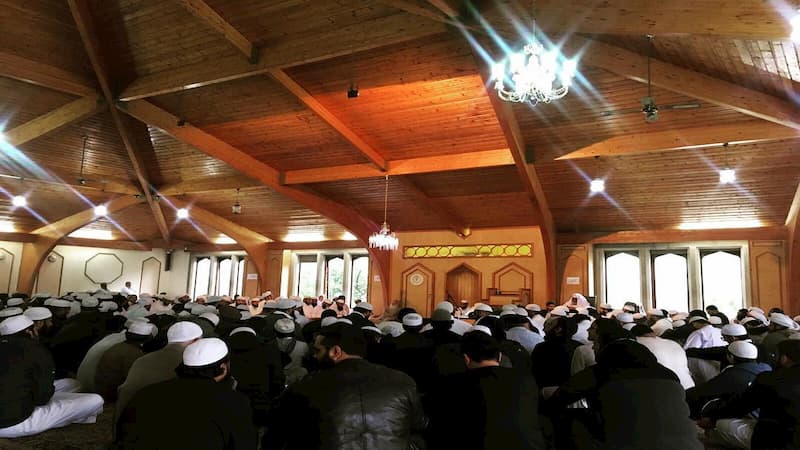


Explore The Wealth of Traditional Islamic Sciences
The Islamic traditional sciences have always been growing disciplines in response to diverse sociopolitical, philosophical and scientific challenges. A deeper analysis of Islamic normative positions related to a diverse range of important modern issues like logic, metaphysics, artificial intelligence, evolution, Islam and politics, genetics, Islamic psychology and societal ethics in a rapidly changing world, is proving quite challenging and crossing the lines of enquiry which question concepts we have never explored before or ever thought possible. There have been many attempts by Muslim scholars to address many areas of these challenges and their application to new cases. However, these Islamic disciplines have had to grow both horizontally and vertically to the degree that our current application of the wealth of our Islamic tradition to new and challenging issues is unfortunately still in its prime stages. There are immense works of classical Muslim scholars which require intense study with the prospect of it benefiting future generations. Some of these works are in manuscript form and others remain unread except by a few.

Addressing The Contemporary Issues
The horizontal growth is one which requires us to go back to the sources of our classical theology, substantive law, jurisprudence and ethics and tease out the nuances, and essential shariʿ principles that provide the guidance and framework to allow Islamic responses to technical questions. This requires Muslim scholars to have expertise in broader areas of theology, ʿilm al-kalām, tafsīr, ḥadīth, fiqh, language and rhetoric and tārīkh. The vertical growth is where these disciplines have now diversified beyond just classical text, and into many other specialties making it intersect with sciences such as philosophy, epistemology, metaphysics, anthropology, politics and other areas of humanities and social sciences. To meet these challenges requires preparation of Muslim scholars who have expert academic background knowledge of these sciences and the skillset to work closely with others embracing both good leadership qualities and aptitude to deliver the Islamic response that is both appropriate and informed through a multidisciplinary approach.


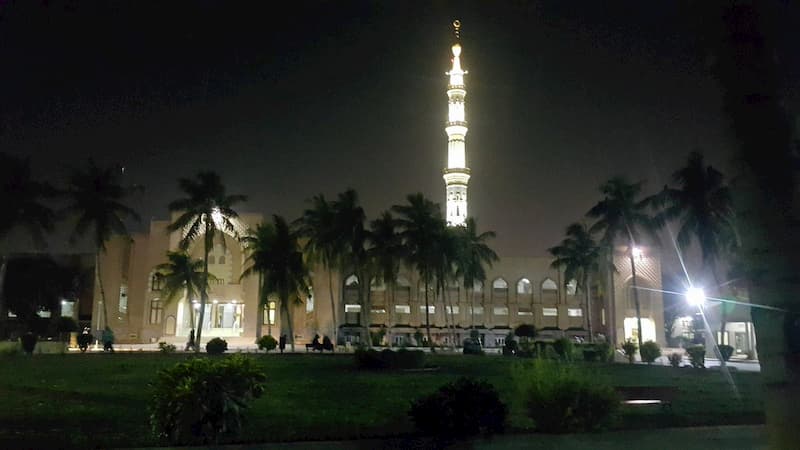
Become One of the Heirs of the Prophet (PBUH) Under the Guidance of Traditional Scholars
The most important aspect of the whole programme will ensure that the beneficial traditional element of madrasa learning is maintained as much as possible. This is to be achieved by ensuring that all our main scholars have been trained and have gone through robust teaching under the tutelage of their teachers through a successive chain of traditional learning that extends to the Prophet (PBUH). The approach unique to our madāris requires students to form an important relationship with their scholars and teachers which is both academic and essential for spiritual and personal development. This traditional approach will be woven throughout the syllabus content and delivery style so that students have a virtual madrasa experience. This is an exciting opportunity for students to learn, develop and connect to a line of traditional ʿulama who have a chain of learning all the way to our beloved Prophet (PBUH). After successful completion of this programme students will receive formal ijāza (authorization) and ʿAlimiyyah sanad enabling them to be included amongst the heirs of the prophets. The goal is to produce Muslim scholars who can contribute to their areas of expertise confidently, to bring about a meaningful impact and to respond to contemporary challenges.

Programme Aims & Objectives
The Program aims to achieve several key objectives:
1. Advanced Expertise in Classical Islamic Text:
– Develop profound understanding of classical Islamic literature.
– Explore chapters from diverse disciplines within classical Islamic theology, fiqh, uṣūl al-fiqh, tafsīr, ḥadīth, and kalām literature.
– Emphasize scrutiny of classical Islamic themes, particularly in the Ḥanafi Sunni schools of jurisprudence.
– Compare and contrast concepts relevant to contemporary contexts.
2. Specialized Knowledge in Contemporary Sciences and Islamic Literature:
– Foster advanced understanding of modern sciences and contemporary fields.
– Apply an academic approach to Islamic ethics and contemporary Islamic literature.
– Critically analyze various facets of contemporary tafsir, kalam, fiqh, and uṣūl al-fiqh literature.
– Contextualize studies within anthropological, sociological, and philosophical paradigms influencing modern Islamic practice.
3. Research, Analytical Skills, and Application of Islamic Tradition:
– Develop advanced research skills and critical analysis abilities.
– Attain high standards in contemporary academic literature writing and advanced delivery.
– Engage in research, learning, and exploration of concepts, theories, and principles in Islamic sciences.
– Understand the profound impact of Islamic tradition on both conventional and contemporary issues.
4. Personal, Professional, Spiritual, and Academic Skills Development:
– Cultivate essential skills for Muslim scholars.
– Participate in skills-based courses to identify and address strengths and weaknesses.
– Emphasize enhancing spiritual self-reflection, emotional literacy, effective communication, and presentation skills.
5. Contribution to Future Leadership in the Islamic Tradition:
– Nurture a new generation of Muslim scholars proficient in various Islamic disciplines.
– Equip scholars to address post-modern world issues through a multidisciplinary approach.
– Guide, identify, analyze, and resolve challenges in theology, philosophy, and anthropology.
– Contribute to the revival of the spirit of Islam in academic literature, committees, and allied industries.
6. Platform for Networking, Career Guidance, and Internship:
– Provide opportunities to connect with internationally recognized Muslim scholars and subject experts.
– Offer professional and spiritual guidance.
– Aim to create a new generation of ‘ulama’ capable of leading the Ummah and making a global impact.
– Facilitate networking and internship opportunities to further students' practical experiences.
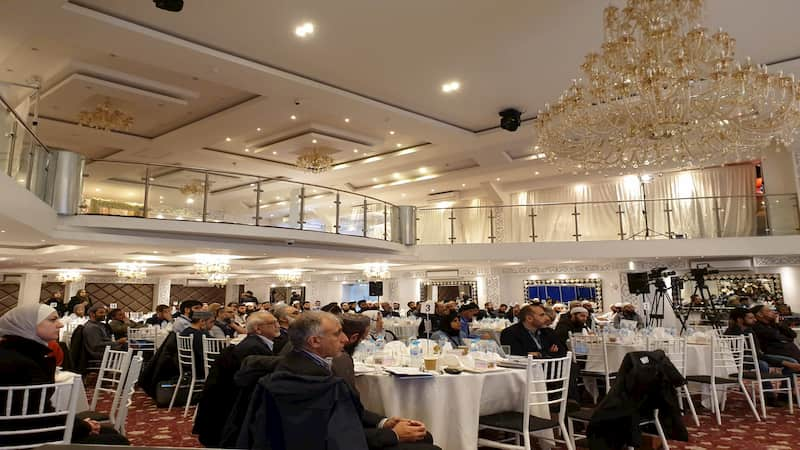

Testimonials
Frequently Asked Questions
What are the foundational components of the Alimiyyah Programme, including its Curriculum Streams? Furthermore, could you elaborate on the distinctive avenues the program provides for spiritual growth?
The essential building blocks of the Alimiyyah program consist of:
- Levels:
The Alimiyyah programme is structured into four levels, each comprising multiple semesters. These levels form the foundational structure of the program, guiding students through increasingly advanced studies.
- Semesters:
A semester is a defined period of academic study, typically lasting around six months, during which students engage in focused study. Each level contains multiple semesters, providing a structured framework for progression. With two semesters per year, students advance through the program systematically.
- Modules:
Modules represent individual subjects or classes within each semester. These modules cover diverse topics such as Arabic Grammar, Fiqh, Quran Studies, Hadith Studies, and others.
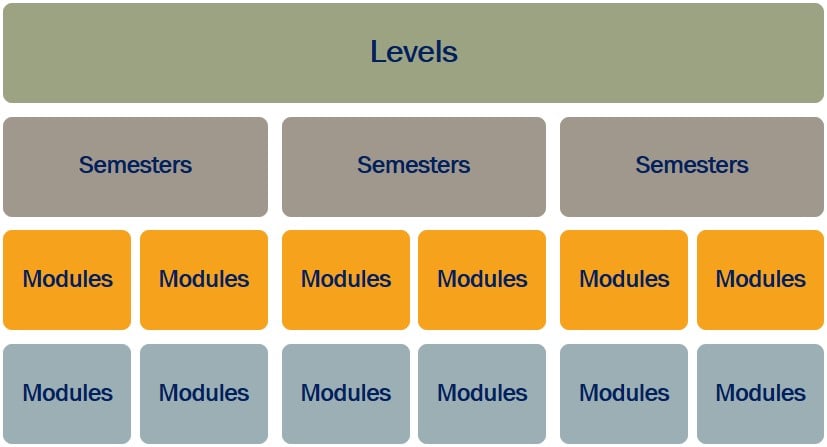
(A suggestive depiction of levels, semesters, and modules)
Curriculum Streams:
Curriculum streams are dedicated streams within the following list of disciplines, consisting of Islamic Studies and Arabic-centric subjects. Each curriculum stream comprises multiple modules, and each level of the Alimiyyah programme features a balanced dedication of modules from each stream.
Streams:
- Aqidah & Islamic Theology
- Quranic Studies
- Hadith Studies
- Fiqh & Contemporary Fiqh Studies
- Arabic Language*
- Seerah and Islamic History
- Logic (Mantiq)
- Tazkiyah Studies
- Tajwid & Hifz
- Western Studies
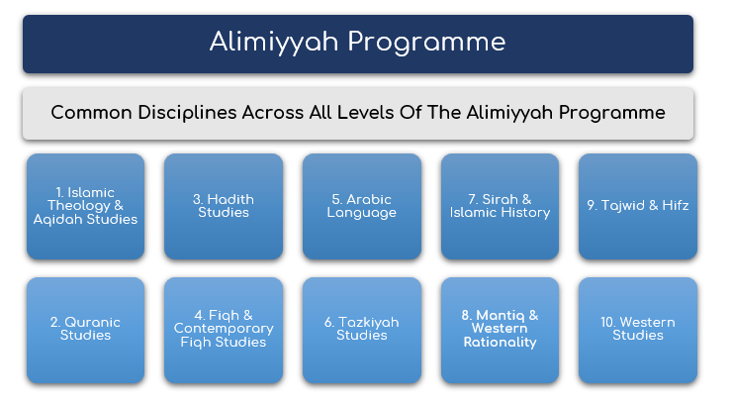
(Curriculum Stream of the Alimiyyah Programme)
* As a prerequisite before joining the Alimiyyah Programme, students are expected to know the Arabic alphabet & be able to read the Qur’an fluently.
Opportunities for Spiritual Growth:
Additionally, our program features flagship Tazkiyah-centric modules, meticulously designed to suit the diverse backgrounds and learning styles of our students. These modules integrate a harmonious blend of traditional wisdom and contemporary methodologies, facilitating not only the acquisition of knowledge but also the cultivation of spiritual well-being. By offering personalized guidance and resources, we aim to nurture a profound understanding of spirituality, enabling students to embark on a transformative journey towards holistic Islamic education and personal enlightenment.
Do both full-time and part-time students need to complete all four levels of the Alimiyyah program? Additionally what sets these two student types apart from each other?
Yes, whether a student is full-time or part-time, they all have to complete all four levels to finish their Alimiyyah program.
The difference between the two types of students lies in the duration of their completion. A part-time student completes their Alimiyyah in 16 semesters, spanning across 8 years, whereas a full-time student completes it in 10 semesters, spanning across 5 years.
- Regarding the difference between the 2 types of students:
For Full-Time students: the Alimiyyah Foundation, spanning two semesters; the Alimiyyah Intermediate, covering three semesters; the Alimiyyah Advanced, also comprising three semesters; and finally, the Daurah Hadith, which spans two semesters. Thus coming to a total of 10 semesters completed in 5 years.
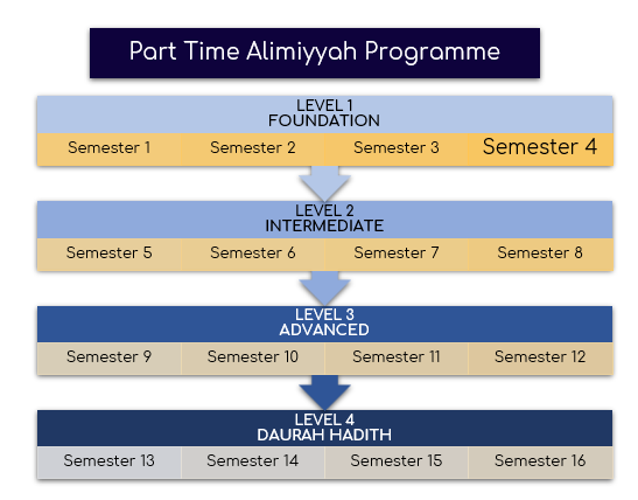
(Full-Time Alimiyyah Programme Track)
- For Part-Time students: the Alimiyyah program includes four semesters each for the Alimiyyah Foundation, Alimiyyah Intermediate, Alimiyyah Advanced, and Daurah Hadith, totaling 16 semesters completed over 8 years.
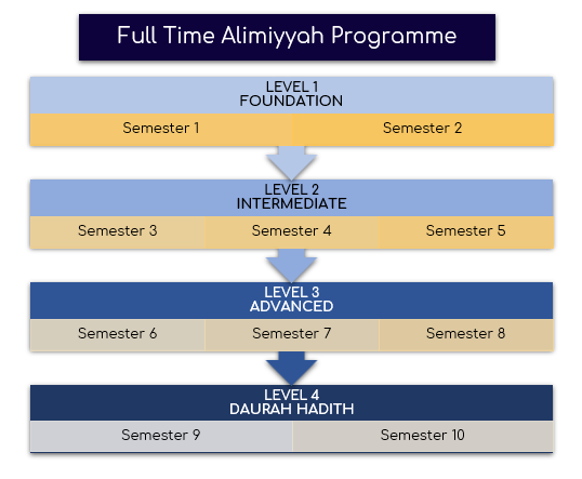
(Part-Time Alimiyyah Programme Track)
Why are full-time students able to complete their Alimiyyah program sooner than part-time students? Do both types of students cover the same modules in their program or do full-time students cover more, thus making their Alimiyyah more comprehensive?
Full-time students are able to complete their Alimiyyah program sooner than part-time students because they commit to a larger number of weekly hours for modules. Consequently, they cover more modules in a single semester.
Regarding the types of modules covered by the 2 different types of students, both types of students cover the same modules and content in their Alimiyyah Programme. We maintain consistency across both full-time and part-time students, ensuring that the syllabus remains uniform regardless of the mode of study.
How are the classes delivered? Additionally, is there any opportunity for direct interaction with scholars?
Classes are delivered live online and include a mix of tutorials, presentation-based lectures, textbook-based traditional lectures, seminars, and workshops. Recordings of these sessions are made available on DUA student’s learning portal for 24/7 access from both web browsers and the Mobile App.
Regarding direct interaction, Yes, students have the opportunity to join Al Balagh's Exclusive annual residential camp. This optional component allows for spiritual development through direct interaction with world-renowned scholars.
I think I’m at an advanced level as I have completed it partially in the past. What is the way forward?
The programme is exclusively tailored to provide students with an opportunity to develop advanced expertise in Islamic Sciences in a short period.
Currently, we are accepting applications for Level 1, but If you are interested in Level 2 or Level 3 and have prior qualification in the field based on prior study history in the Alimiyyah or Arabic programme from elsewhere, then kindly include information of your prior study subjects history in detail and attach the transcripts in the application. After receiving your application, our admission team will make a decision based on your merits and also arrange an assessment meeting after your enrollment to get you enrolled in the correct level/year of Alimiyyah Programme.
How long does it take for an advanced student to receive a decision on which level will be offered?
The final decision on which level will be offered, based on your assessment and prior examination record, can take weeks to complete due to the high influx of students during our enrollment weeks. Therefore, we encourage all students to apply as soon as possible to ensure timely processing of their applications.
I saw the timings on the website and I’m confused if it will suit my schedule/timezone. What do I do?
The timings listed on the website are primarily for beginner-level classes. However, for advanced students, class timings may vary and can be scheduled anywhere from 10 am to 9 pm UK time on Saturdays and Sundays. A more specific timetable will be shared closer to the launch date. Therefore, we recommend maintaining flexibility in your expectations regarding class timings.
If you find yourself unable to enroll in all the modules offered to you, there's no need to worry. You should select only those modules for which you can ensure a minimum of 50% live attendance. Modules where this commitment isn't feasible can be postponed to future semesters.
It's important to note that depending on the number of modules you choose to take per semester, your overall trajectory for completing the Alimiyyah programme will be affected. Therefore, we advise all students to carefully consider their module selection and its impact on their academic journey.
How are advanced classes determined in the Alimiyyah programme, and how does course selection work each semester?
Advanced classes in the Alimiyyah programme are suggested based on your proficiency assessment conducted during a meeting with the Evaluation & Assessment Team. Each semester offers Core and Elective Courses. The Evaluation & Assessment Team will provide guidance on course selection after thoroughly assessing your profile. Additionally, students have the opportunity to apply for exemption from core courses if they can demonstrate prior completion of these courses or possess the necessary level of knowledge.
I can't take all my classes on weekends. Can I draw some classes from weekdays?
Apologetically No. Students must remain in their designated track, either Weekend or Weekday, and are not permitted to mix classes between the two tracks. However, it is possible to switch tracks entirely, meaning a student who initially enrolled in the weekday track but wishes to shift to the weekend track can do so. However, such a shift must be done as soon as possible. Additionally, students should be aware of the starting months for each track:
- Weekday tracks start in February and September of every year
- Weekend tracks start in November and May of every year
(However, please note that occasional changes may occur in the launch dates. For the most recent launch dates or any updates, please feel free to contact our team for assistance.)
If students intend to switch from one track to another, they must do so at a time when the new semester for the intended track is set to begin.
Is the programme suitable for those unable to attend live sessions?
Unfortunately, the program does not accommodate students who are entirely unable to attend live sessions. However, all live sessions are meticulously recorded and promptly uploaded onto the DUA learning portal for convenient access. It is imperative for students to maintain at least 50% live attendance as we do not provide provisions for students who solely rely on recordings without any live participation or presence in the class. We strongly encourage and deem it necessary for students to have active participation and presence in live sessions, considering the sacredness and nature of the studies involved.
How many study hours do we have to dedicate as a part-time or a full-time student?
PART-TIME STUDENTS: For part-time students, we advise allocating specific hours per week / weekend for live classes. Additionally, we suggest dedicating additional time for revision and self-study.
- It's essential to recognize that each student possesses unique strengths and abilities, so their required study hours may vary accordingly.
|
Level |
Live Classes per week/weekend |
Revision & Self-Study |
|---|---|---|
|
1. (Alimiyyah Foundation) |
8-10 hrs |
5 hrs approximately |
|
2. (Alimiyyah Intermediate) |
15+ hrs |
5-7 hrs approximately |
|
3. (Alimiyyah Advanced) |
15+ hrs |
5-7 hrs approximately |
|
4. (Daurah Hadith) |
15+ hrs |
5-7+ hrs approximately |
FULL-TIME STUDENTS: For full-time students, we advise allocating specific hours per week / weekend for live classes. Additionally, we suggest dedicating additional time for revision and self-study.
- It's essential to recognize that each student possesses unique strengths and abilities, so their required study hours may vary accordingly.
|
Level |
Live Classes per week/weekend |
Revision & Self-Study |
|---|---|---|
|
1 (Alimiyyah Foundation) |
18-20 hrs |
7+ hrs approximately |
|
2 (Alimiyyah Intermediate) |
20+ hrs |
7-9 hrs approximately |
|
3 (Alimiyyah Advanced) |
20+ hrs |
7-9 hrs approximately |
|
4 (Daurah Hadith) |
15+ hrs |
10+ hrs approximately |
What are the exam categories on which my evaluation will be done?
Examinations can fall into 1 of 2 categories, depending on the discretion of the teacher and the subject type.
1) Self-Paced examinations: Students can start and finish the exam whenever they want within the set time frame. This means that you can take as much time as you need to complete the exam, or you can complete it quickly if you feel confident.
2) Timed examinations: Students shall be given a fixed amount of time to complete the exam. In timed examinations, students must manage their time carefully in order to complete all the questions within the allotted time frame. The exam is usually proctored and sufficient time shall be given for attempting the exam.
Here are further details:
- Assessments 1 & 2:
Online and self-paced assessments for Assessments 1 and 2 are conducted without live written or live verbal tests. These assessments are administered through the student Learning Management System (LMS) by the examination and administrative team. Students typically have an average of 3-4 weeks after the release date to attempt the assessments.
Syllabus Demarcation:
- The syllabus for Assessment 1 covers material from Week 1 to Week 5, though this timeline may slightly vary according to instructor discretion.
- Similarly, the syllabus for Assessment 2 encompasses material from Week 6 to Week 10, with potential variations based on instructor discretion.
Percentage Weightage Allocation:
- In terms of weightage, Assessment 1 accounts for 15% of the overall grade,
- While Assessment 2 carries a weightage of 25%.
2. For Final Exams:
For Final Exams, the examinations will be conducted online, live, and proctored. These exams are administered through the student Learning Management System (LMS) by the examination and administrative team.
Students are allotted an average of 2-3 hours per exam paper to attempt their exams in a proctored environment.
It's important to note that the camera must be turned on for the entire duration of the exam. Therefore, students need to have access to a camera and adequate audio for the exam.
Syllabus Demarcation:
The syllabus for the Final Exam covers material from Week 11 until the Concluding Week of the semester.
Percentage Weightage Allocation:
In terms of weightage, the Final Exam carries a significant weight of 60% towards the overall grade.
What are the attendance requirements and policies at the academy?
Attendance is crucial for success in our programs. Here's a brief overview of our attendance policies:
-
- Regular Attendance: We expect and encourage regular attendance for all classes. Attendance is recorded and factors into evaluations of responsibility, participation, and progress.
- Unauthorized Absences:
-
- Short-term: Missing class for two consecutive weeks without approval may result in temporary access revocation (temporary removal of the student's access to classes, course materials, LMS, or other educational resources until the issue is resolved).
- Extended: Four weeks of continuous unapproved absence leads to enrollment suspension. Re-admission is required to continue studies.
- Authorized Absences: For any planned absences, prior authorization is needed. Notify your support group in advance with valid reasons and necessary documentation.
- Subject-wise Attendance: A minimum of 50% live class attendance is required per subject to be eligible for final exams. This policy is strictly enforced, with regular attendance audits conducted by the administrative team to ensure compliance.
- Semester-wise Excused Absences: The policy regarding allowed excused absences varies based on the academic level of the students enrolled in the program.
- Level 1 students are permitted up to 50% excused absences,
- Level 2 students up to 30%, and
- Level 3 students up to 20%.
It's important to note that exceeding these allowable absences may result in disciplinary action being taken by higher management. This policy is in place to ensure that students maintain consistent attendance and engagement with their teachers and studies throughout their academic journey.
Emergency Absences: In emergencies, inform your support group/admin as soon as possible to make necessary accommodations and keep your academic progress on track.
When do I receive the Certificate/Ijazah?
The Alimiyyah programme is divided into 4 levels.
Upon successful completion of the first level, students will be awarded:
الشهادة الثانوية العامة في العلوم الإسلامية واللغة العربية
Upon successful completion of the second level, students will be awarded:
الشهادة الثانوية الخاصة في العلوم الإسلامية واللغة العربية
Upon successful completion of the third level, students will be awarded:
الشهادة العالية في العلوم الإسلامية واللغة العربية
Upon successful completion of the final level, students will be awarded:
الشهادة العالمية و الإجازة العالية في العلوم الإسلامية
When will I have access to the learning portal?
Upon successful enrollment, you will get access to DUA, Al Balagh Academy’s advanced online learning portal. Login details and important contact information will be provided to your registered email address. We recommend joining classes from a laptop/desktop computer for better visibility and learning experience.
Student access is of 2 types:
- Main class/batch access:
- Students get access to their batch's main class on the LMS within 24-72 hours.
- This section of the LMS includes various policies and guidelines essential for every student to read through, understand, and acknowledge.
- Module access:
- The second access type is for the specific modules for the semester that students have registered for.
- Every module will have its own access point, where class links, session summaries, notes, presentations, etc., will be uploaded as the weeks go by. This access is given after the orientation session week concludes.
Orientation session week: There will be an orientation week organized in the first week of the Programme to make students comfortable with the LMS platform, programme structure, schedule, instructors and peers. All support materials like the LMS Guide, Student Guidelines Handbook etc will be uploaded by the admins on the LMS for easier understanding.
Additionally, students enrolled in the Alimiyyah Programme will maintain access to their modules and related information on the Learning Management System (LMS) throughout their enrollment period. However, should a student withdraw or become unenrolled for the semester, access to their previous modules will be discontinued.
DUA - Darul Uloom AlBalagh
Can I access the course content at any time? And Is there a mobile app for accessing my courses?
The recordings of live sessions are uploaded onto our DUA student’s learning portal, providing 24/7 accessibility from both a web browser and the Al Balagh Academy Mobile App, enabling students to review and revise at their own pace and convenience.
Regarding a mobile App: Absolutely! We've got you covered for on-the-go learning with our newly updated mobile app. Gain maximum flexibility in your learning journey by accessing your courses anytime, anywhere. Simply click on the links below to download the latest Al Balagh Academy App tailored to your device:
- For Android users: Download from the Google Play Store
- For iOS users: Download from the App Store
Dive into a world of convenient and accessible learning today!
Do we have WhatsApp groups for communication?
Certainly! We've established a dedicated Student Support Group on WhatsApp to serve as your primary communication channel throughout your journey with us.
Following your Orientation week and completion of class selection, you'll be automatically added to your respective Module-wise "Groups" on the DUA Learning Portal. These groups will provide you with invaluable support and connectivity with fellow students, ensuring a smooth and enriching learning experience.
What is the structure of the onboarding programme?
Kindly note that we will be following these steps for completing the Al Balāgh Online ʿĀlimiyyah Programme Student Onboarding (after the official start date).
Step 1: Creation of WhatsApp Personal Support Group: A WhatsApp Personal Support Group will be established, with select members of the admin team added to assist you.
Step 2: Schedule Sharing: Students will be provided with their schedule based on the batch they have selected for enrollment.
Step 3: Access Provision: Upon schedule sharing, module-wise access will be granted. Modules will become visible on the DUA portal (https://dua.albalaghacademy.org/user_dashboard) within 1-2 days after the schedule has been shared.
Step 4: Module-Wise Groups: Module-specific groups will be available within the portal for each class. Students are encouraged to join these groups for class-related discussions after gaining access to their respective classes.
Support and Queries: Should you have any inquiries regarding the enrollment process or require assistance, feel free to reach out immediately within your support groups.
Scholarship Support: Al Balagh Academy values seekers of knowledge more than anything. Please visit here to apply for a scholarship. Our team will assess your application and respond in 2-3 working days.
What is the mentoring programme and who can participate in it?
We understand that pursuing Alimiyyah studies can present various challenges, despite the presence of dedicated support groups within our institution. Therefore, we take an extra step by offering individualized mentoring to ensure that our students receive the assistance they need to thrive academically, personally and spiritually. The mentoring programme is designed specifically for our Alimiyyah students, offering dedicated mentors throughout their semesters. These mentors provide personalized advice and guidance to students as they navigate through their academic journey.
Additionally, there are no additional fees required for accessing mentoring services. Mentoring support is included as part of your enrollment in the Alimiyyah programme.
The areas in which the mentors can assist their mentees are as follows:
In today's fast-paced and demanding academic environment, ensuring the success and well-being of our students is a top priority.
- Mentors offer guidance on time management and coping strategies, reducing the risk of burnout and dropout rates.
- One-to-one mentoring provides personalized support, aiding students in navigating challenges more effectively.
- Mentoring sessions offer a confidential space for students to discuss concerns and learn healthy coping mechanisms.
- Mentors provide valuable insights for spiritual development, benefiting students in their educational journey.
- Guidance from mentors empowers students to overcome obstacles and stay committed to their academic pursuits.
Concerned about Flexibility?
We provide a 100% Money Back Guarantee for the First 4 Weeks. Join us today for a secure and enriching experience in Islamic learning!
You can review our Refund policy HERE!
Will I get notification for live sessions?
You will be able to view all course wise live session details including joining links on your DUA Portal calendar(students are advised to join classes from the LMS directly). If you find any difficulty with the link/calendar students are advised to contact their respective support groups; where our dedicated support team will ensure that their problem gets resolved at the earliest.
Regarding General Help:
1) If you have questions about your ongoing classes, assessment matters, or IT/technical issues, please reach out to us through your respective Support groups only. (Please Note: It may take 2-3 days for our team to resolve the issue due to the volume of students.)
2) If you're interested in joining a different course/programme and need information, please get in touch with our admission team:
Email support: [email protected]
WhatsApp Support: http://wa.me/447946835804
What are the foundational components of the Alimiyyah Programme, including its Curriculum Streams? Furthermore, could you elaborate on the distinctive avenues the program provides for spiritual growth?
The essential building blocks of the Alimiyyah program consist of:
- Levels:
The Alimiyyah programme is structured into four levels, each comprising multiple semesters. These levels form the foundational structure of the program, guiding students through increasingly advanced studies.
- Semesters:
A semester is a defined period of academic study, typically lasting around six months, during which students engage in focused study. Each level contains multiple semesters, providing a structured framework for progression. With two semesters per year, students advance through the program systematically.
- Modules:
Modules represent individual subjects or classes within each semester. These modules cover diverse topics such as Arabic Grammar, Fiqh, Quran Studies, Hadith Studies, and others.

(A suggestive depiction of levels, semesters, and modules)
Curriculum Streams:
Curriculum streams are dedicated streams within the following list of disciplines, consisting of Islamic Studies and Arabic-centric subjects. Each curriculum stream comprises multiple modules, and each level of the Alimiyyah programme features a balanced dedication of modules from each stream.
Streams:
- Aqidah & Islamic Theology
- Quranic Studies
- Hadith Studies
- Fiqh & Contemporary Fiqh Studies
- Arabic Language*
- Seerah and Islamic History
- Logic (Mantiq)
- Tazkiyah Studies
- Tajwid & Hifz
- Western Studies

(Curriculum Stream of the Alimiyyah Programme)
* As a prerequisite before joining the Alimiyyah Programme, students are expected to know the Arabic alphabet & be able to read the Qur’an fluently.
Opportunities for Spiritual Growth:
Additionally, our program features flagship Tazkiyah-centric modules, meticulously designed to suit the diverse backgrounds and learning styles of our students. These modules integrate a harmonious blend of traditional wisdom and contemporary methodologies, facilitating not only the acquisition of knowledge but also the cultivation of spiritual well-being. By offering personalized guidance and resources, we aim to nurture a profound understanding of spirituality, enabling students to embark on a transformative journey towards holistic Islamic education and personal enlightenment.
Do both full-time and part-time students need to complete all four levels of the Alimiyyah program? Additionally what sets these two student types apart from each other?
Yes, whether a student is full-time or part-time, they all have to complete all four levels to finish their Alimiyyah program.
The difference between the two types of students lies in the duration of their completion. A part-time student completes their Alimiyyah in 16 semesters, spanning across 8 years, whereas a full-time student completes it in 10 semesters, spanning across 5 years.
- Regarding the difference between the 2 types of students:
For Full-Time students: the Alimiyyah Foundation, spanning two semesters; the Alimiyyah Intermediate, covering three semesters; the Alimiyyah Advanced, also comprising three semesters; and finally, the Daurah Hadith, which spans two semesters. Thus coming to a total of 10 semesters completed in 5 years.

(Full-Time Alimiyyah Programme Track)
- For Part-Time students: the Alimiyyah program includes four semesters each for the Alimiyyah Foundation, Alimiyyah Intermediate, Alimiyyah Advanced, and Daurah Hadith, totaling 16 semesters completed over 8 years.

(Part-Time Alimiyyah Programme Track)
Why are full-time students able to complete their Alimiyyah program sooner than part-time students? Do both types of students cover the same modules in their program or do full-time students cover more, thus making their Alimiyyah more comprehensive?
Full-time students are able to complete their Alimiyyah program sooner than part-time students because they commit to a larger number of weekly hours for modules. Consequently, they cover more modules in a single semester.
Regarding the types of modules covered by the 2 different types of students, both types of students cover the same modules and content in their Alimiyyah Programme. We maintain consistency across both full-time and part-time students, ensuring that the syllabus remains uniform regardless of the mode of study.
How are the classes delivered? Additionally, is there any opportunity for direct interaction with scholars?
Classes are delivered live online and include a mix of tutorials, presentation-based lectures, textbook-based traditional lectures, seminars, and workshops. Recordings of these sessions are made available on DUA student’s learning portal for 24/7 access from both web browsers and the Mobile App.
Regarding direct interaction, Yes, students have the opportunity to join Al Balagh's Exclusive annual residential camp. This optional component allows for spiritual development through direct interaction with world-renowned scholars.
I think I’m at an advanced level as I have completed it partially in the past. What is the way forward?
The programme is exclusively tailored to provide students with an opportunity to develop advanced expertise in Islamic Sciences in a short period.
Currently, we are accepting applications for Level 1, but If you are interested in Level 2 or Level 3 and have prior qualification in the field based on prior study history in the Alimiyyah or Arabic programme from elsewhere, then kindly include information of your prior study subjects history in detail and attach the transcripts in the application. After receiving your application, our admission team will make a decision based on your merits and also arrange an assessment meeting after your enrollment to get you enrolled in the correct level/year of Alimiyyah Programme.
How long does it take for an advanced student to receive a decision on which level will be offered?
The final decision on which level will be offered, based on your assessment and prior examination record, can take weeks to complete due to the high influx of students during our enrollment weeks. Therefore, we encourage all students to apply as soon as possible to ensure timely processing of their applications.
I saw the timings on the website and I’m confused if it will suit my schedule/timezone. What do I do?
The timings listed on the website are primarily for beginner-level classes. However, for advanced students, class timings may vary and can be scheduled anywhere from 10 am to 9 pm UK time on Saturdays and Sundays. A more specific timetable will be shared closer to the launch date. Therefore, we recommend maintaining flexibility in your expectations regarding class timings.
If you find yourself unable to enroll in all the modules offered to you, there's no need to worry. You should select only those modules for which you can ensure a minimum of 50% live attendance. Modules where this commitment isn't feasible can be postponed to future semesters.
It's important to note that depending on the number of modules you choose to take per semester, your overall trajectory for completing the Alimiyyah programme will be affected. Therefore, we advise all students to carefully consider their module selection and its impact on their academic journey.
How are advanced classes determined in the Alimiyyah programme, and how does course selection work each semester?
Advanced classes in the Alimiyyah programme are suggested based on your proficiency assessment conducted during a meeting with the Evaluation & Assessment Team. Each semester offers Core and Elective Courses. The Evaluation & Assessment Team will provide guidance on course selection after thoroughly assessing your profile. Additionally, students have the opportunity to apply for exemption from core courses if they can demonstrate prior completion of these courses or possess the necessary level of knowledge.
I can't take all my classes on weekends. Can I draw some classes from weekdays?
Apologetically No. Students must remain in their designated track, either Weekend or Weekday, and are not permitted to mix classes between the two tracks. However, it is possible to switch tracks entirely, meaning a student who initially enrolled in the weekday track but wishes to shift to the weekend track can do so. However, such a shift must be done as soon as possible. Additionally, students should be aware of the starting months for each track:
- Weekday tracks start in February and September of every year
- Weekend tracks start in November and May of every year
(However, please note that occasional changes may occur in the launch dates. For the most recent launch dates or any updates, please feel free to contact our team for assistance.)
If students intend to switch from one track to another, they must do so at a time when the new semester for the intended track is set to begin.
Is the programme suitable for those unable to attend live sessions?
Unfortunately, the program does not accommodate students who are entirely unable to attend live sessions. However, all live sessions are meticulously recorded and promptly uploaded onto the DUA learning portal for convenient access. It is imperative for students to maintain at least 50% live attendance as we do not provide provisions for students who solely rely on recordings without any live participation or presence in the class. We strongly encourage and deem it necessary for students to have active participation and presence in live sessions, considering the sacredness and nature of the studies involved.
How many study hours do we have to dedicate as a part-time or a full-time student?
PART-TIME STUDENTS: For part-time students, we advise allocating specific hours per week / weekend for live classes. Additionally, we suggest dedicating additional time for revision and self-study.
- It's essential to recognize that each student possesses unique strengths and abilities, so their required study hours may vary accordingly.
|
Level |
Live Classes per week/weekend |
Revision & Self-Study |
|---|---|---|
|
1. (Alimiyyah Foundation) |
8-10 hrs |
5 hrs approximately |
|
2. (Alimiyyah Intermediate) |
15+ hrs |
5-7 hrs approximately |
|
3. (Alimiyyah Advanced) |
15+ hrs |
5-7 hrs approximately |
|
4. (Daurah Hadith) |
15+ hrs |
5-7+ hrs approximately |
FULL-TIME STUDENTS: For full-time students, we advise allocating specific hours per week / weekend for live classes. Additionally, we suggest dedicating additional time for revision and self-study.
- It's essential to recognize that each student possesses unique strengths and abilities, so their required study hours may vary accordingly.
|
Level |
Live Classes per week/weekend |
Revision & Self-Study |
|---|---|---|
|
1 (Alimiyyah Foundation) |
18-20 hrs |
7+ hrs approximately |
|
2 (Alimiyyah Intermediate) |
20+ hrs |
7-9 hrs approximately |
|
3 (Alimiyyah Advanced) |
20+ hrs |
7-9 hrs approximately |
|
4 (Daurah Hadith) |
15+ hrs |
10+ hrs approximately |
What are the exam categories on which my evaluation will be done?
Examinations can fall into 1 of 2 categories, depending on the discretion of the teacher and the subject type.
1) Self-Paced examinations: Students can start and finish the exam whenever they want within the set time frame. This means that you can take as much time as you need to complete the exam, or you can complete it quickly if you feel confident.
2) Timed examinations: Students shall be given a fixed amount of time to complete the exam. In timed examinations, students must manage their time carefully in order to complete all the questions within the allotted time frame. The exam is usually proctored and sufficient time shall be given for attempting the exam.
Here are further details:
- Assessments 1 & 2:
Online and self-paced assessments for Assessments 1 and 2 are conducted without live written or live verbal tests. These assessments are administered through the student Learning Management System (LMS) by the examination and administrative team. Students typically have an average of 3-4 weeks after the release date to attempt the assessments.
Syllabus Demarcation:
- The syllabus for Assessment 1 covers material from Week 1 to Week 5, though this timeline may slightly vary according to instructor discretion.
- Similarly, the syllabus for Assessment 2 encompasses material from Week 6 to Week 10, with potential variations based on instructor discretion.
Percentage Weightage Allocation:
- In terms of weightage, Assessment 1 accounts for 15% of the overall grade,
- While Assessment 2 carries a weightage of 25%.
2. For Final Exams:
For Final Exams, the examinations will be conducted online, live, and proctored. These exams are administered through the student Learning Management System (LMS) by the examination and administrative team.
Students are allotted an average of 2-3 hours per exam paper to attempt their exams in a proctored environment.
It's important to note that the camera must be turned on for the entire duration of the exam. Therefore, students need to have access to a camera and adequate audio for the exam.
Syllabus Demarcation:
The syllabus for the Final Exam covers material from Week 11 until the Concluding Week of the semester.
Percentage Weightage Allocation:
In terms of weightage, the Final Exam carries a significant weight of 60% towards the overall grade.
What are the attendance requirements and policies at the academy?
Attendance is crucial for success in our programs. Here's a brief overview of our attendance policies:
-
- Regular Attendance: We expect and encourage regular attendance for all classes. Attendance is recorded and factors into evaluations of responsibility, participation, and progress.
- Unauthorized Absences:
-
- Short-term: Missing class for two consecutive weeks without approval may result in temporary access revocation (temporary removal of the student's access to classes, course materials, LMS, or other educational resources until the issue is resolved).
- Extended: Four weeks of continuous unapproved absence leads to enrollment suspension. Re-admission is required to continue studies.
- Authorized Absences: For any planned absences, prior authorization is needed. Notify your support group in advance with valid reasons and necessary documentation.
- Subject-wise Attendance: A minimum of 50% live class attendance is required per subject to be eligible for final exams. This policy is strictly enforced, with regular attendance audits conducted by the administrative team to ensure compliance.
- Semester-wise Excused Absences: The policy regarding allowed excused absences varies based on the academic level of the students enrolled in the program.
- Level 1 students are permitted up to 50% excused absences,
- Level 2 students up to 30%, and
- Level 3 students up to 20%.
It's important to note that exceeding these allowable absences may result in disciplinary action being taken by higher management. This policy is in place to ensure that students maintain consistent attendance and engagement with their teachers and studies throughout their academic journey.
Emergency Absences: In emergencies, inform your support group/admin as soon as possible to make necessary accommodations and keep your academic progress on track.
When do I receive the Certificate/Ijazah?
The Alimiyyah programme is divided into 4 levels.
Upon successful completion of the first level, students will be awarded:
الشهادة الثانوية العامة في العلوم الإسلامية واللغة العربية
Upon successful completion of the second level, students will be awarded:
الشهادة الثانوية الخاصة في العلوم الإسلامية واللغة العربية
Upon successful completion of the third level, students will be awarded:
الشهادة العالية في العلوم الإسلامية واللغة العربية
Upon successful completion of the final level, students will be awarded:
الشهادة العالمية و الإجازة العالية في العلوم الإسلامية
When will I have access to the learning portal?
Upon successful enrollment, you will get access to DUA, Al Balagh Academy’s advanced online learning portal. Login details and important contact information will be provided to your registered email address. We recommend joining classes from a laptop/desktop computer for better visibility and learning experience.
Student access is of 2 types:
- Main class/batch access:
- Students get access to their batch's main class on the LMS within 24-72 hours.
- This section of the LMS includes various policies and guidelines essential for every student to read through, understand, and acknowledge.
- Module access:
- The second access type is for the specific modules for the semester that students have registered for.
- Every module will have its own access point, where class links, session summaries, notes, presentations, etc., will be uploaded as the weeks go by. This access is given after the orientation session week concludes.
Orientation session week: There will be an orientation week organized in the first week of the Programme to make students comfortable with the LMS platform, programme structure, schedule, instructors and peers. All support materials like the LMS Guide, Student Guidelines Handbook etc will be uploaded by the admins on the LMS for easier understanding.
Additionally, students enrolled in the Alimiyyah Programme will maintain access to their modules and related information on the Learning Management System (LMS) throughout their enrollment period. However, should a student withdraw or become unenrolled for the semester, access to their previous modules will be discontinued.
DUA - Darul Uloom AlBalagh
Can I access the course content at any time? And Is there a mobile app for accessing my courses?
The recordings of live sessions are uploaded onto our DUA student’s learning portal, providing 24/7 accessibility from both a web browser and the Al Balagh Academy Mobile App, enabling students to review and revise at their own pace and convenience.
Regarding a mobile App: Absolutely! We've got you covered for on-the-go learning with our newly updated mobile app. Gain maximum flexibility in your learning journey by accessing your courses anytime, anywhere. Simply click on the links below to download the latest Al Balagh Academy App tailored to your device:
- For Android users: Download from the Google Play Store
- For iOS users: Download from the App Store
Dive into a world of convenient and accessible learning today!
Do we have WhatsApp groups for communication?
Certainly! We've established a dedicated Student Support Group on WhatsApp to serve as your primary communication channel throughout your journey with us.
Following your Orientation week and completion of class selection, you'll be automatically added to your respective Module-wise "Groups" on the DUA Learning Portal. These groups will provide you with invaluable support and connectivity with fellow students, ensuring a smooth and enriching learning experience.
What is the structure of the onboarding programme?
Kindly note that we will be following these steps for completing the Al Balāgh Online ʿĀlimiyyah Programme Student Onboarding (after the official start date).
Step 1: Creation of WhatsApp Personal Support Group: A WhatsApp Personal Support Group will be established, with select members of the admin team added to assist you.
Step 2: Schedule Sharing: Students will be provided with their schedule based on the batch they have selected for enrollment.
Step 3: Access Provision: Upon schedule sharing, module-wise access will be granted. Modules will become visible on the DUA portal (https://dua.albalaghacademy.org/user_dashboard) within 1-2 days after the schedule has been shared.
Step 4: Module-Wise Groups: Module-specific groups will be available within the portal for each class. Students are encouraged to join these groups for class-related discussions after gaining access to their respective classes.
Support and Queries: Should you have any inquiries regarding the enrollment process or require assistance, feel free to reach out immediately within your support groups.
Scholarship Support: Al Balagh Academy values seekers of knowledge more than anything. Please visit here to apply for a scholarship. Our team will assess your application and respond in 2-3 working days.
What is the mentoring programme and who can participate in it?
We understand that pursuing Alimiyyah studies can present various challenges, despite the presence of dedicated support groups within our institution. Therefore, we take an extra step by offering individualized mentoring to ensure that our students receive the assistance they need to thrive academically, personally and spiritually. The mentoring programme is designed specifically for our Alimiyyah students, offering dedicated mentors throughout their semesters. These mentors provide personalized advice and guidance to students as they navigate through their academic journey.
Additionally, there are no additional fees required for accessing mentoring services. Mentoring support is included as part of your enrollment in the Alimiyyah programme.
The areas in which the mentors can assist their mentees are as follows:
In today's fast-paced and demanding academic environment, ensuring the success and well-being of our students is a top priority.
- Mentors offer guidance on time management and coping strategies, reducing the risk of burnout and dropout rates.
- One-to-one mentoring provides personalized support, aiding students in navigating challenges more effectively.
- Mentoring sessions offer a confidential space for students to discuss concerns and learn healthy coping mechanisms.
- Mentors provide valuable insights for spiritual development, benefiting students in their educational journey.
- Guidance from mentors empowers students to overcome obstacles and stay committed to their academic pursuits.
Concerned about Flexibility?
We provide a 100% Money Back Guarantee for the First 4 Weeks. Join us today for a secure and enriching experience in Islamic learning!
You can review our Refund policy HERE!
Will I get notification for live sessions?
You will be able to view all course wise live session details including joining links on your DUA Portal calendar(students are advised to join classes from the LMS directly). If you find any difficulty with the link/calendar students are advised to contact their respective support groups; where our dedicated support team will ensure that their problem gets resolved at the earliest.
Regarding General Help:
1) If you have questions about your ongoing classes, assessment matters, or IT/technical issues, please reach out to us through your respective Support groups only. (Please Note: It may take 2-3 days for our team to resolve the issue due to the volume of students.)
2) If you're interested in joining a different course/programme and need information, please get in touch with our admission team:
Email support: [email protected]
WhatsApp Support: http://wa.me/447946835804







